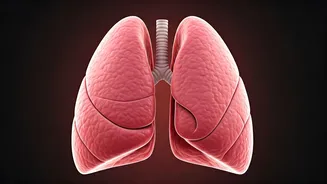Sugary Drinks and Lung Function
Consuming sugary beverages frequently can have detrimental effects on your lung function. High sugar intake is often linked to weight gain, and obesity
is a known risk factor for respiratory issues. Excess weight can put pressure on the diaphragm, restricting lung expansion and reducing the amount of air you can take in. Furthermore, the inflammatory response triggered by excessive sugar consumption can worsen existing lung conditions like asthma or COPD. Therefore, reducing your intake of sugary sodas, juices, and other sweetened drinks can significantly improve your lung health by mitigating these risks. Opting for water, unsweetened tea, or naturally flavored beverages is a smart move toward healthier lungs and better breathing overall. Staying hydrated also helps the body function optimally, including maintaining clear airways and healthy mucus production, which are critical for smooth and effortless breathing. This simple change to your diet can make a notable difference.
Processed Meats: A Risk
Processed meats are frequently preserved using methods that can introduce substances which irritate the lungs. These meats, including bacon, sausages, and deli meats, often contain nitrates and nitrites. When heated, these compounds can release nitrosamines, which are known to be carcinogenic and can also irritate the respiratory system. The presence of these substances can trigger inflammation and worsen existing respiratory conditions. Regular consumption of processed meats has been associated with an increased risk of chronic obstructive pulmonary disease (COPD) and other lung-related problems. Reducing your intake of processed meats can help minimize exposure to harmful additives. Consider selecting fresh, unprocessed meat options and cooking them at home to have control over the ingredients used. This dietary shift not only lowers your risk of lung damage but also provides you with healthier, more natural protein sources essential for overall body function and well-being. Focusing on fresh foods is a powerful way to bolster your respiratory health.
Salty Foods and Airways
High sodium intake is another factor that can negatively impact your lung health. Excess salt consumption can lead to fluid retention, which can cause swelling and put extra pressure on your lungs. This increased pressure can make breathing more challenging and can exacerbate symptoms in individuals with conditions like asthma. Moreover, high sodium levels can contribute to inflammation throughout the body, including the lungs. Inflammation can narrow the airways, making it harder for air to flow freely. Minimizing your intake of salty snacks, processed foods, and high-sodium condiments can significantly reduce the strain on your respiratory system. Instead of adding salt, try flavoring your meals with herbs and spices for taste. By choosing fresh, low-sodium options, you not only support your lungs but also enhance your overall heart health. Remember that making thoughtful food choices is essential for maintaining clear airways and effortless breathing.
Dairy and Breathing Issues
Dairy products can sometimes increase mucus production, which can be problematic for people with respiratory conditions. While dairy isn't harmful to everyone, for some, the proteins in milk can stimulate the body to produce extra mucus. Increased mucus can clog the airways, making breathing more difficult, and it can worsen symptoms like coughing and wheezing, especially for those with asthma or allergies. If you notice an increase in mucus or other respiratory symptoms after consuming dairy products, consider reducing your intake or trying alternatives. There are several non-dairy milk options available, such as almond milk, soy milk, and oat milk. These options can help reduce inflammation and mucus production, thus promoting clearer airways. Monitoring your body's response to dairy and making necessary adjustments can bring relief and improve respiratory health. It is wise to pay attention to how your body reacts to these foods, adjusting your diet to your personal needs.
Fried Foods and Lungs
The process of frying foods often involves high heat and the production of potentially harmful compounds that can impact lung health. When food is fried at high temperatures, it can produce acrolein and other harmful substances. Inhaling these fumes can irritate the respiratory system, potentially causing inflammation and increasing the risk of respiratory problems. Moreover, fried foods are typically high in unhealthy fats, which can contribute to weight gain. As previously mentioned, obesity can negatively affect lung function. Reducing your consumption of fried foods can help lessen your exposure to these harmful substances and improve your breathing. Opt for healthier cooking methods like baking, grilling, or steaming. These methods preserve the natural flavors of the food while minimizing the formation of harmful compounds, providing you with nutritious meals that support your respiratory health. Focusing on healthier cooking methods is a positive choice for better breathing.
Alcohol's Effect on Lungs
Excessive alcohol consumption can negatively affect lung function, leading to breathing difficulties. Alcohol can weaken the immune system, making the lungs more susceptible to infections like pneumonia and bronchitis. When alcohol is metabolized, it can cause the airways to become inflamed, which makes it harder to breathe. Also, some people with asthma or other respiratory conditions may find that alcohol triggers their symptoms. Moderation is key when it comes to alcohol intake. Limiting your consumption can help protect your respiratory health. Non-alcoholic beverages, such as water or tea, can offer the refreshment without the risks. Making these healthy beverage choices can significantly contribute to better lung health, reducing inflammation and improving respiratory function. Being mindful of your alcohol intake is one of the many simple steps you can take to make breathing easier.
Refined Grains and Airways
Refined grains, often found in white bread, pastries, and processed snacks, can cause issues for your lungs. These foods have a high glycemic index, leading to rapid spikes in blood sugar levels. This can trigger inflammation throughout the body, including in the lungs. Chronic inflammation can cause the airways to narrow, making breathing more difficult. In addition, refined grains lack the fiber found in whole grains, which can affect overall gut health. A healthy gut is crucial for a strong immune system, and a compromised immune system can make the lungs more vulnerable to infections. Swapping refined grains for whole grains like brown rice, quinoa, and whole-wheat bread is beneficial. Whole grains offer fiber and essential nutrients that support lung health. Incorporating whole grains into your diet contributes to healthier lungs and a stronger immune system, allowing you to breathe easier and maintain overall good health. Choosing these grains is a simple but important change.














